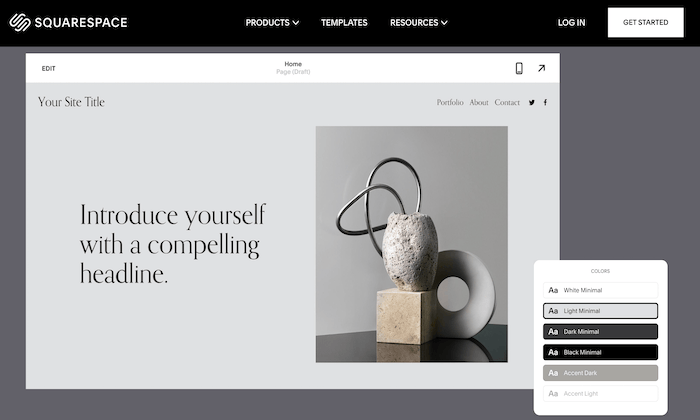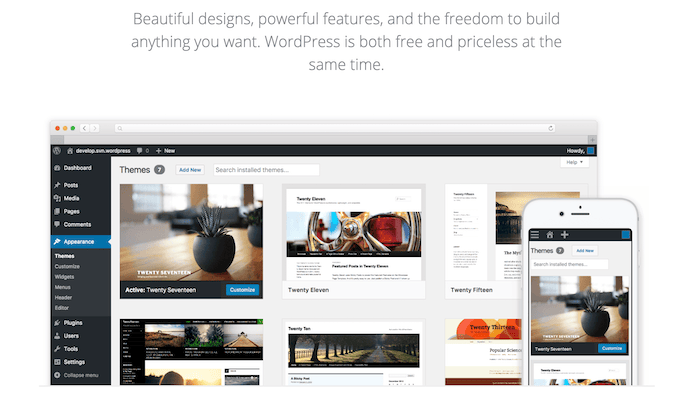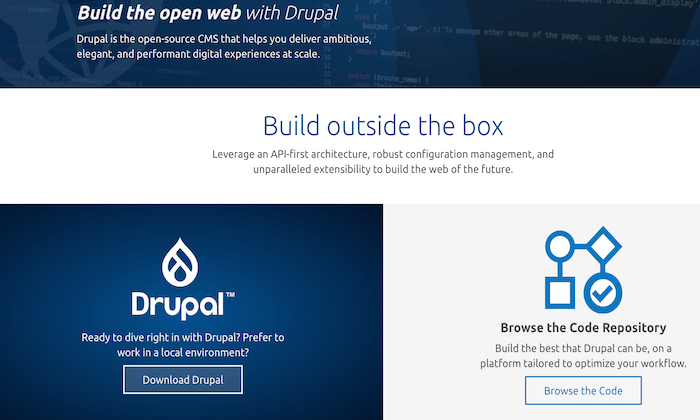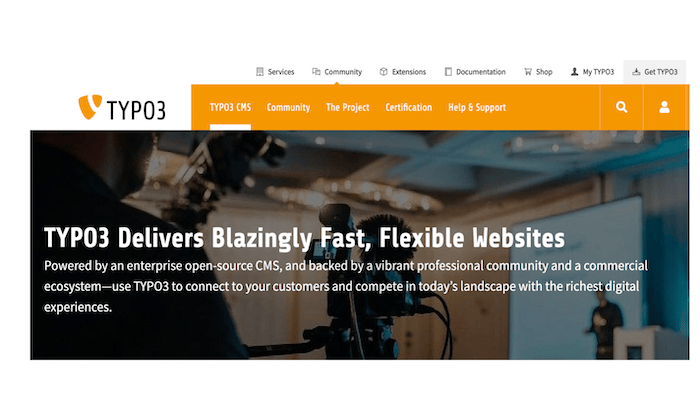Disclosure: This content is reader-supported, which means if you click on some of our links that we may earn a commission.

Do you want to skip the read and get right to my top pick? The best CMS for most people is Wix.
The best content management systems (CMS) allow everyday users to build websites without having to learn programming languages.
Without a CMS, you’d have to write web pages using JavaScript, CSS, and HTML. It also makes managing all your content a lot easier.
There are tons of different content management systems available on the market today. I use WordPress and I can’t imagine using anything else. But if you are just getting started, you might want to check out some of my other top picks–they’re even easier to use.
The best thing you can do is get started. Learn by doing. Keep reading to find out my top picks, and how to decide which system will work best for you.
#1 – Wix Review — The Best CMS for Building New Websites

Wix is one of the easiest website builders available on the market today. Its simplicity makes it a popular choice for non-technical users who want to create a website from scratch.
I like Wix because it offers an intuitive drag-and-drop building tool. So you can add elements to your site and manage your content without writing a single line of code.
I’m serious. There is nothing remotely technical that you have to know in order to get started.
Choose from hundreds of templates, or use Wix Artificial Design Intelligence (ADI) to spin up a site for you. All you do is answer a few questions about yourself, your business, and your goals, and Wix ADI will build out a great looking site on the spot.
As you build your site and add content, Wix helps you keep track of everything. The dashboard is very easy to navigate. You’ll be able to see how many people are viewing your site and which content is performing best. Everything is a few clicks away.
A key part of a good CMS is how consistently fast they can deliver your content to site visitors. Wix has built a solid infrastructure of data centers that keep load times and uptime remarkably consistent.
Powerful servers do a lot of the work there, but Wix also features auto-scaling technology. That way, if your site gets suddenly very popular, Wix’s servers will adapt to provide your site the resources so every visitor still gets a quality experience.
Aside from Wix being an excellent choice for beginners, here’s a quick overview of the other highlights that make this CMS stand out from the crowd:
- 500+ free templates
- Optimized for SEO and mobile
- Create password protected membership pages
- Contact management tools for subscriber lists
- Ecommerce capability with product pages, payment acceptance, and store management
- Bookings and calendar management
- Blog management tools with multiple writers and contributors
- Photography, video, and media management tools
- Free hosting and free SSL certificate
- 24/7 managed security monitoring and incident reponse
Overall, Wix’s content management system is extremely versatile. It’s trusted by restaurants, musicians, online stores, small businesses, bloggers, and sites in virtually every industry.
The platform is free to use with a Wix subdomain, but that’s not really practical for most users. Premium plans start at just $14 per month. Signup now.
#2 – Squarespace Review — The Best CMS for Creative Professionals

Squarespace is an all-in-one website builder. But unlike other similar CMS platforms on the market, Squarespace has a unique differentiator—beautiful designs.
The award-winning templates offered by Squarespace are second to none. These can be fully customized to fit your site’s needs.
These modern designs make Squarespace a popular content management choice for creative professionals, musicians, artists, and portfolio sites. Let’s take a closer look at some of the other noteworthy highlights available with this CMS:
- Free domain for the first year
- Intuitive website builder
- Free logo making tool
- Ecommerce and blogging capabilities
- Third-party extensions for expanding functionality
- Built-in marketing tools
- SEO tools and mobile optimized
- 24/7 customer support
Squarespace plans start at $12 per month. If you’re looking for a simple way to manage your portfolio site, this will be a top content management system to consider.
#3 – Shopify Review — The Best CMS for Ecommerce Sites

If you’re starting an online store and need an ecommerce-specific CMS, look no further than Shopify.
Businesses of all shapes and sizes have been using Shopify to sell online. Whether you’re building a new site from scratch or switching from your existing CMS, Shopify can accommodate your needs.
Let’s take a closer look and see why Shopify’s CMS platform ranks so high on my list:
- Manage products and sell from your site, social media, and online marketplaces
- Built-in marketing tools
- Simple dashboard to manage products, orders, payments, and shipping
- 4,100+ apps to add features and functionality to your site
- Free SSL certificate
- Unlimited products
- 24/7 support
Shopify even has a marketplace of experts for hire. So if you need assistance with SEO or getting your store setup, you can find a qualified expert directly within the platform.
Another reason to consider Shopify as your CMS platform is because it’s built to scale. Plans start at $29 per month, and you can try it free for 14 days.
#4 – WordPress Review — The World’s Most Popular CMS

WordPress powers 38% of the Internet, making it the most popular content management system on the planet.
The platform supports everything from small personal blogs to some of the biggest news websites in the world.
As a free and open-source CMS, WordPress is virtually limitless. You’ll have total control over every aspect of your site, with no restrictions on customizations. This makes WordPress a popular choice for developers and tech-savvy users.
But even non-technical users can take advantage of WordPress. It has an extensive library of 57,000+ plugins, which makes it easy to add functionality to your site.
Other top features include:
- Fully customizable designs
- Mobile responsive content
- SEO friendly
- Powerful media management tools
- High performance and easy to access
The downside of using a free and open-source CMS is that you don’t have dedicated support. But WordPress has an extensive network of developers, content creators, and site owners who are active on community forums.
You’ll also have to get your web hosting plan and domain registration on your own from third-parties.
#5 – Drupal Review — The Best WordPress Alternative

Drupal is another free and open-source content management system.
If you need multiple page templates and content types, Drupal is a viable alternative to WordPress. It’s also more equipped to handle advanced user permissions.
Drupal is a popular choice for developers, marketers, and agencies alike. It’s used to manage content across a wide range of industries, including healthcare, ecommerce, retail, FinTech, travel, media, government, and more.
Some of the top features and noteworthy highlights include:
- Content authoring
- Content as a service
- Marketing automation
- Robust security
- High performance, scalability, and accessibility
- Advanced personalizations
So if you’re looking for open-source functionality but don’t like WordPress, I’d go with Drupal for content management.
#6 – TYPO3 Review — The Best Enterprise CMS

TYPO3 isn’t the most well-recognized name in the CMS space. But it’s not for everyone.
It’s another free and open-source platform (like WordPress and Drupal), but it’s branded as an “enterprise-class CMS.” Global leaders like Mercedes-Benz and Sony rely on TYPO3 for content management.
In addition to being used by large corporations, TYPO3 is actually a popular choice for European-based websites. Here are some of the reasons why this CMS platform made my list:
- Ability to support corporate environments
- Fully scalable multi-site management
- Multilingual installations
- Easy to set up on your existing infrastructure
- High speed and performance
The average user will likely lean towards WordPress or Drupal. But global organizations with complex content management needs should consider an alternative like TYPO3.
What I Looked at to Find the Best Content Management System
There are specific elements that you need to consider as you’re shopping around and evaluating various CMS platforms.
Use the following factors as a buying guide to help narrow down your options and choose the best option for your site:
Usability
The primary factor that you need to consider is the usability of a CMS. What will you be using it for? Who specifically will be using it?
Marketers and writers might be creating the content, but those people may not have the skills to manage it online, format it, and write lines of code. If this sounds like your scenario, make sure the CMS is easy enough for non-technical users to manage.
Look for solutions with a WYSIWYG (what you see is what you get) editor, drag-and-drop building tools, simple publishing features, and the ability to embed third-party content or add rich media.
The type of website you’re creating will also fall into this category. For example, blogs, ecommerce sites, and portfolio sites won’t have the same needs.
Security
Security should always be a top concern when you’re looking at CMS software.
Some platforms will have built-in safeguards and security features to fight off malicious attacks and hackers. Other tools rely on third-party plugins and extensions for security. Generally speaking, popular and open-source CMS platforms are more vulnerable to attacks. You’ll have to install your own security plugins to adequately keep your site safe.
But these platforms typically have an extensive marketplace with a plethora of plugins—so it shouldn’t be too difficult, even though it requires an extra step.
SEO
The best content management systems will come standard with features and tools to boost your SEO efforts.
Examples include XML site maps, meta descriptions, custom permalink structures, alt text, title tags, etc. In addition to these out-of-the-box SEO features, you should consider using CMS software that will let you add third-party plugins or extensions to better serve and enhance your SEO strategy.
Support
Find out what type of technical support is provided by the CMS platform you’re using.
What happens if you have a question, run into a problem, or need help? Will you be stuck to figure it out on your own? Or can you seek assistance from a support agent?
If you’re using an open-source CMS, you probably won’t have the luxury of dedicated support. You’ll have to rely on tutorials, self-help articles, and forums. But if you’re using a site builder or SaaS CMS, you can usually expect 24/7 support.
Custom Capabilities
Some CMS software will restrict what you can do with your website.
For many people, this is a non-issue. But for those of you looking for complete customization with no restrictions, you’ll have to go with an open-source CMS system.
These platforms let you customize everything using the HTML code of your site. So it’s a great choice for developers and tech-savvy users. With that said, even non-technical users can benefit from customization by leveraging third-party plugins or extensions.
If you can’t find a custom function from a feature marketplace, you’ll need to have a developer build one for you. Make sure your CMS is compatible with this level of customization if you plan to go this route.
Summary
With so many CMS systems available on the market today, there are really only six that I can recommend with conviction:
- Wix — Best CMS for building new websites
- Squarespace — Best CMS for creative professionals
- Shopify — Best CMS for ecommerce sites
- WordPress — The world’s most popular CMS
- Drupal — Best WordPress alternative
- TYPO3 — Best enterprise CMS
Wix is my top recommendation for most people launching a new site. It’s a welcoming, easy to use, and plenty of templates to help people get started.
After that, it depends what you need and what feels good to work with. Your preferences really matter.
I use WordPress for my blog, and I really like it. I’m constantly trying out new plugins and adding new functionality to my site. It works for me.
If I had an online store, though, I would probably use Shopify for my CMS.
At the end of the day, it depends on your goals, and what you like using.
Follow the links and explore your options in greater detail. You may even be able to take advantage of a promotion and get a better price.
Use free trials, too. This is going to give you the clearest sense of which content management system works the best before you put money down.
from Neil Patel's Digital Marketing Blog https://ift.tt/yJqjuvR

No comments:
Post a Comment